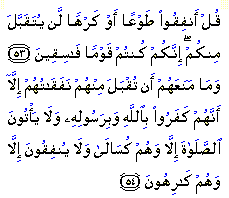Rejected Donations, Prophet's Morning Program, Passage of Time,
Issue 220 » May 2, 2003 - Safar 30, 1424
General
| Living the Quran |
Al-Tawba (Repentance) Whose Donations and
Deeds are not Accepted?
These verses are referred to the hypocrites
(Munafiqeen), i.e. those Muslims who may have outward appearance or actions of Islam,
but inside they are weak and resent real efforts to practice Islam in
their private life.
Though a general allusion is made to
the organized body of hypocrites of Madinan society, as Imam ar-Razi documented, "Ibn
Abbas has said that the verse was revealed in reference to Jadd b. Qays
who wished to stay away from Jihad on a pretext, but who offered
monetary help to the cause." Hence they took the position
that while they would like to be exempted from actual struggle, in
order to find a way an easy escape, they would be willing to make financial
contribution to the Cause in public.
Reasons for Rejection
Yusuf Ali notes, "Three reasons are specifically given for their rejection:
(1) they did not believe in God and His Messenger; (2) their prayers
were not earnest, but mere show; (3) in reality, their hearts were not
behind the contributions they offered. Nothing is acceptable to Allah
that does not proceed from a pure and sincere heart."
Syed Qutb puts it in a beautiful, concise
manner: "Such is the condition of the hypocrites
of ALL times: fear and appeasement, a heart twisted and a conscience disturbed,
appearances devoid of spirit and putting up a show against what the soul
conceals."
Half-Hearted Prayers
Every now and then, everyone feels lazy and
sluggish about their daily prayers; this condition is natural and can
be improved. However, many people do the Prayers with
fervor (making sure they pray every bit of Sunnah and Nafl
prayers) when in a gathering or congregation, but abandon the same acts of
worship when in privacy. This is precisely the implication
of the word 'Kusala', used in verse 54, which
stems from hypocrisy and a weak faith.
Syed Iqbal Zaheer, in his encyclopaedic work
of Tafseer, Ishraq al-Ma'ani, clarifies, "The
above does not absolve, rather only warns. The obligations of Islam, of
whatever nature they may be, must be performed, whatever the condition
of the heart, and forgiveness must be asked for deficiencies."
|
| Understanding the Prophet's Life |
His Morning Program Prophet of Allah, peace be upon him, went to the Masjid after the call of the Fajr Adhan. After the prayer, he would sit with his companions and converse with them, instructing them on various aspects of Din. He would answer questions on religious or personal matters. These early morning gatherings were occasions for open discussion as well, and were by no means limited to religion alone. Stories of the past were recalled, and poetry was recited. Charity, war booty, and land tax was also distributed at this time. Sometimes the companions related their dreams to him. He interpreted their dreams and told them their meanings. Once in a while, he would describe his own dreams to the companions. His dreams were always meaningful. They were the media through which Allah showed him the events to come. After Sunrise, Prophet of Allah prayed four or eight Raka'at of the morning prayer (a voluntary prayer). Then he went home to participate in the household work. Source: |
| Poetic Reflection |
Passage of Time
"Each day that
passes, a portion of me it takes away, "Years pass by with
beloved ones in happiness, "Man rejoices as long
as the nights continue to pass by, "We take delight in
every day that we have lived, Source:
"Time in the Life of a Muslim" - Dr. Yusuf Al-Qaradawi |
